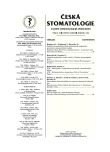-
Medical journals
- Career
Immediate Implants and Their Use in Clinical Stomatological Practice
Authors: K. Kaňovská; P. Prachár
Authors‘ workplace: Stomatologická klinika LF MU a FN U Sv. Anny, Brno přednosta prof. MUDr. J. Vaněk, CSc.
Published in: Česká stomatologie / Praktické zubní lékařství, ročník 105, 2005, 3, s. 73-77
Overview
The authors describe the history and present possibilities to solve deficient dentition by means of immediate implantation. The implants are mostly introduced into alveolus in a certain time lapse after tooth extraction, when the optimal bone structure is optimally restored. Under certain circumstances, if there is a sufficient amount of the bone in the apical area of the extraction alveoli, the endosseous implant can be introduced immediately after the tooth extraction. The communication lists other indications and contraindications of this method. The advantage of immediate implantation lay in the considerably shortened time period between the tooth extraction and placement of definitive substitution, the number of surgical interventions is reduced and the patient accepts better the general therapeutic plan. A certain disadvantage lays in the more complex short-term solution of a temporary substitute due to unsuitable alveolar process and in a potentially higher risk of infection developed for the contamination of the operated on place by microorganisms from the tooth affected by periodontitis. Gradual VNI implants have been recently introduced in the Czech Republic as immediate implants.
Key words:
immediate implantation – endosseous implants – biological materials
Labels
Maxillofacial surgery Orthodontics Dental medicine
Article was published inCzech Dental Journal

2005 Issue 3-
All articles in this issue
- Immediate Implants and Their Use in Clinical Stomatological Practice
- LCH-Histiocytosis from Langerhans Cells in Craniofacial Region
- Reconstruction of Bone Defects after Operations on Voluminous Maxillary Cysts
- Disorder of Wound Healing in Dentoalveolar Practice
- Adhesive Systems in Morphological Picture. I. Tetric Ceram HB
- Verification of Validity of Caries Measuring by Laser Fluorescent Apparatus KaVo DIAGNOdent
- Prevalence of Apical Periodontitis and Frequency of Root-Filled Teeth in an Adult Czech Population
- Focal Infection of Dental Origin – (Review article)
- Stability of Bone Bed Crest of Loaded Implant – Comparison with Finite Element Models
- Czech Dental Journal
- Journal archive
- Current issue
- Online only
- About the journal
Most read in this issue- Focal Infection of Dental Origin – (Review article)
- Prevalence of Apical Periodontitis and Frequency of Root-Filled Teeth in an Adult Czech Population
- Immediate Implants and Their Use in Clinical Stomatological Practice
- Verification of Validity of Caries Measuring by Laser Fluorescent Apparatus KaVo DIAGNOdent
Login#ADS_BOTTOM_SCRIPTS#Forgotten passwordEnter the email address that you registered with. We will send you instructions on how to set a new password.
- Career

